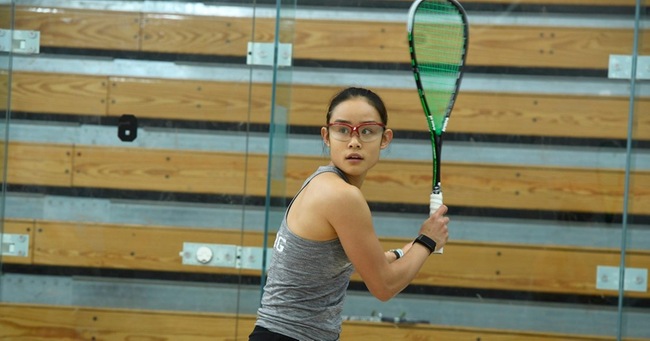
Sue Ann Yong '18 graduated in May and is now based in Boston, MA.
Tuesday, July 3, 2018
Written Senior Perspective: Sue Ann Yong ’18
The 2018 Senior Perspectives is the 13th in a series of annual collections. Senior captains and representatives of teams at Harvard have been invited to contribute viewpoints based on personal experience from both their senior seasons and full varsity careers at Harvard.
Sue Ann Yong
Hometown: Kuala Lumpar, Malaysia
Concentration: Cognitive Neuroscience & Evolution
House Affiliation: Eliot
To live in a sea of accomplished individuals is both humbling and intimidating. We recognize we are the lucky 5.4% of Harvard’s acceptance rate; We are told to seize every opportunity Harvard offers us. Some of the common ones being:
“Try new things and take classes out of your comfort zone that challenge you.”
“Apply for this summer program. It will look really good on your resume.”
“Go to networking events and meet people if you want a job.”
“Go to that party and socialize. Maybe you’ll meet the love of your life.”
They are all exhilarating, but also extremely exhausting. We all know the Harvard stereotypes – competitive, ambitious, hardworking. Those attributes might sound familiar to all of us from our life long relationship with competitive squash. Performing under pressure has become second nature, in the words of our head coach Mike Way: “I’ve been here before, I know what to do” – sounds like the perfect recipe to surviving Harvard.
Being on the Harvard women’s squash team fits right in with the Harvard experience. We are conditioned to be perfect. Literally perfect. 15-0 this season; Winning streak of 53 consecutive matches; Ivy League Champions; 4/4 national titles for the seniors, 18 national titles total – the most of any program in the country.
But being constantly perfect comes with a price. Behind the trophies, the certificates and the big H, it is easy to get lost in the constant chase for perfection, where problem sets, essays and job applications sometimes superseded relationships, social club admissions and leadership positions jeopardize friendships. In a rat race to fulfil our oh-so-bright future as a Harvard graduate, sometimes it seems as if Harvard taught us to cheer for ourselves and to cheer for our peers, but it didn’t teach us to cheer for both ourselves and our peers together. And this is where being a member of Harvard women’s squash has taught me something that neither Harvard nor junior squash did.
Challenge matches are an inevitable part of college squash since it is in an individual sport that is played as a team. In order for teams to justify their ladder, coaches must have team members play official challenge matches with each other to determine a player’s position on the ladder. While challenge matches are vital to ensure fair competition, some teams minimize it because competing against a teammate is conflicting and unnatural.
However, Harvard squash takes this ladder system one step farther. We play challenge matches every Monday, sometimes more, and we are trained to be immersed in this sort of discomfort throughout our college career. We treat our position on the ladder almost like our identity. There’s an undeniable tension to playing Monday challenge matches, and then attending lift sessions together, having team dinner together, and then putting on the same uniform and cheering for each other because beating another team is better than beating each other.
Playing an individual sport as a team, you learn to fight for yourself, but you also learn to fight together. You learn to be selfish on Monday afternoons, but you learn to be selfless on game day. You learn to take competition and harness it into a level of maturity where rivalry and teamwork can coexist. Recognizing myself as imperfect within a perfect team was both challenging and exhilarating, and there is no place better for growth than such an environment.
Source: GoCrimson.com

Post a comment